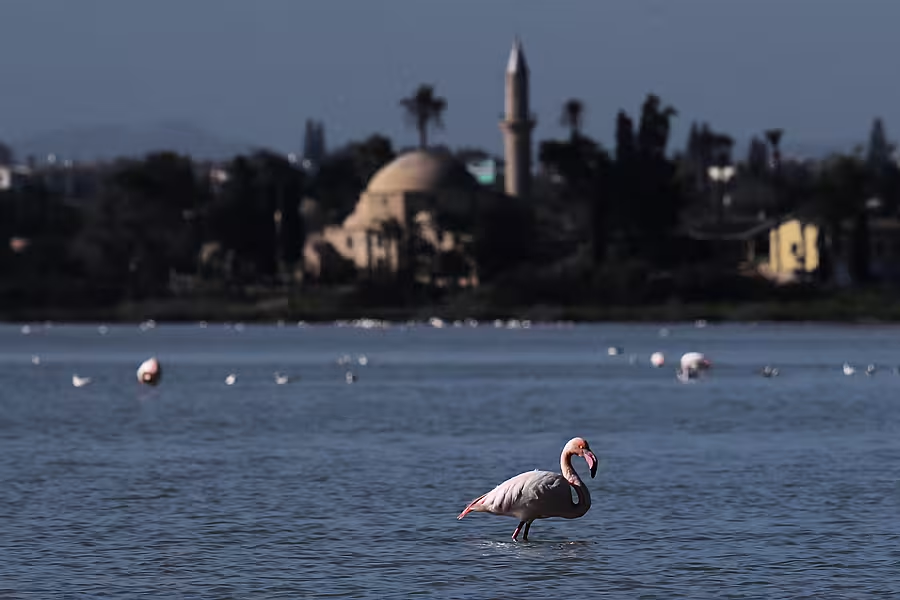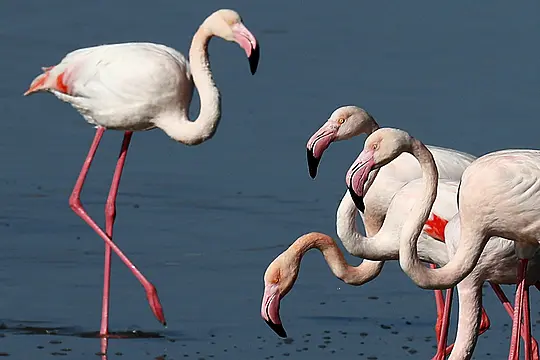Conservationists in Cyprus are urging authorities to expand a hunting ban throughout a coastal salt lake network amid concerns that migrating flamingos could potentially swallow lethal quantities of lead shotgun pellets.
Martin Hellicar, director of Birdlife Cyprus, said flamingos are at risk of ingesting the tiny pellets lying on the lakebed as they feed.
Like other birds, flamingos swallow small pebbles to aid digestion but cannot distinguish between pebbles and the lead pellets.
“Last year, we had tens of losses of flamingos,” Mr Hellicar said.

Cyprus is a key stop on the migration path for many types of birds flying from Africa to Europe.
The Larnaca Salt Lake, a wetlands network of four lakes, typically welcomes as many as 15,000 flamingos from colder climates to the southern coast of the island nation in the eastern Mediterranean. They stay throughout the winter and leave in March.
Other water fowl frequenting the lake include ducks, waders and seagulls.
Hunting is banned around most of the salt lake, but hunters are still allowed to shoot ducks in the network’s southern tip.
The government’s Game and Fauna Service said that, in the first two months of last year, 96 flamingos were found dead in the Larnaca Salt Lake wetlands as a result of lead poisoning.
Cyprus Veterinary Services official Panayiotis Constantinou, who has carried out post-mortem examinations on flamingos, said lead from the pellets poisoned the birds.
The high number of deaths is mainly attributed to heavy winter rain two years ago which stirred up the lake sediment and dislodged embedded lead shot.
A sport shooting range near the lake’s northern tip closed nearly 18 years ago and authorities organised a clean-up of lead pellets in the lakebed there.
But Mr Hellicar said the clean-up was apparently incomplete.

A European Union-funded study is under way to identify where significant amounts of lead pellets remain so they can be removed.
Preliminary results of the study showed “very high” lead levels in the wetland’s southern tip and continued duck hunting there could compound the problem, Mr Hellicar said.
“The problem is pronounced,” he added. “The danger is real for the flamingos and other birds that use the area.”
Cyprus Hunting Federation official Alexandros Loizides disagreed, saying that hunting in a 200m northern swathe is not a problem due to the limited number of hunters.
He said he is unaware of any flamingo deaths in the area and blames pesticide and fertiliser run-off from nearby farms for creating any pollution problems harming wildlife.
“I think the effect of hunting there is very small on the specific part of the lake,” said Mr Loizides. “It’d be a shame for hunters to lose the only area where hunting is permitted near wetlands.”

A ban on the use of lead pellets near wetlands has been in force in Cyprus for several years.
A similar, EU-wide ban took effect last month but conservationists believe the laws are not being enforced enough.
Pantelis Hadjiyeros, head of the Game and Fauna Service, said it is less important to ban hunting in the area than to convince hunters to stop using shells with lead pellets.
“It should be drummed into people that the use of lead pellets is prohibited near wetlands and that only steel pellets are permitted,” he told the Associated Press.







